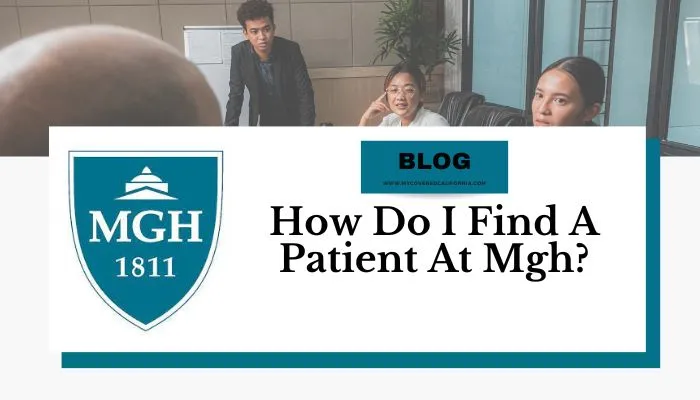Massachusetts General Hospital (MGH) is a world-recognized healthcare facility, consistently ranked one of the best in terms of medical care and research. However, this prestige manifests itself physically as a vast complex of buildings and departments. So, How Do I Find A Patient At Mgh?
For those unfamiliar with MGH’s layout, finding a specific patient can feel like navigating a labyrinth.
Whether you are a worried family member, visiting colleague or simply need to locate someone within the hospital – this guide will provide you with enough information to find your way around.

How Do I Find A Patient At Mgh?
There are many different reasons why it might be important to find a patient at MGH. Here are some:
- Being present during the hospital stay of loved ones is very important for friends and family. Visitors who know where these patients are can give them comfort and support.
- Sometimes doctors or nurses may have something important that they need to tell patient’s closest relatives. Knowing where patient is helps communication flow smoothly ensuring that updates reach promptly.
- Occasionally visitors may be from other health-care professionals attending their patients at MGH.
This ensures coordinated care delivery among various teams in medical field since this would enable one contact another when there has been change in the condition of their mutual patient.
Understanding MGH’s Layout
At first sight, MGH’s enormous size can seem intimidating. The hospital consists of multiple buildings connected by corridors and tunnels. Below is breakdown to help make sense out of everything:
- A City Within a City: Picture MGH as having various specialized quarters found only in small cities. Various sections are contained within separate facilities such as Blake Building which accommodates MG Cancer Center while Lown Building caters Department Psychiatry among others.
- Navigational Tools: To make navigation easier within its complicated internal structure, MGH provides some tools for rescue operations. There are printed maps available at information desks plus interactive directories found on hospital’s website and mobile app.
By getting used to these means long before the search process, one can save a lot of time. MGH has a range of resources that will enable you to find a patient quickly:
1. Direct Communication
Main Desk and Information Desks are the central points from where information is received. Staffed by knowledgeable personnel, these desks handle requests for directions between buildings and may provide information about which floor patients are located.
Each nursing unit has its own nurses’ station. To inquire about someone’s location directly from the nursing staff, one should call the main hospital number and ask to be transferred to the particular unit.
2. Digital Resources
MA detailed list of departments and services can be found in MGH website. The search tool allows one to locate contact details such as phone numbers or floor locations for particular departments.
| One way of finding patients easily is through using mobile applications offered by hospitals like MGH. This app includes an interactive map showing you each part of their compound such as various buildings as well as departments within them. |
However, some functions in it can allow only authorized users (with permission) like family members know which room a patient is (depending on privacy settings).
3. Physical Resources
The hospital information desks have printed maps and directories which are readily available. They give detailed description of the buildings, sections as well as patient care units.
Therefore, once you get here, take a second to pick one up and familiarize yourself with some major sites around. Another way to find a patient is through hospitals staff.
| The Use of Maps: By following these tips and using available resources navigating MGH for your patients becomes an easier process, allowing you to concentrate on what matters most – being there for your loved one during their hospital stay. |
Talking to Hospital Staff: The Art of Communication
Finding a patient often involves interacting with hospital staff. Below are some ways in which you can ensure that interaction goes smoothly.
| Communication Tip | Description |
|---|---|
| Be Clear When Seeking Help | Provide precise and brief information about the patient, including their full name, date of birth, or medical record number. If known, specify the department or type of care the patient is receiving to expedite the search process. |
| Identify the Appropriate Staff Members | Recognize hospital staff based on their attire: blue scrubs denote nursing staff, while green or other colors indicate technicians. Knowing who to approach saves time and minimizes frustration. |
| Provide Relevant Context | Clearly state your relationship to the patient (family member, friend, coworker) and explain the purpose of your visit. This helps staff understand the urgency and privacy considerations associated with the request, ensuring they provide pertinent information. |
| Exercise Patience | Understand that hospital staff are often busy attending to patients and have tight schedules. Be patient while waiting for assistance, recognizing that they prioritize patient care. Avoid unnecessary interruptions and respect their workload. |
MGH Staff Are Busy With Patients’ Care First Given That They’re Always On Tight Schedules: Please have some patience, since they are supposed to be attending to other patients.
Navigating MGH’s Physical Environment
To alleviate anxiety and save time, it is important for you to have a plan on how you will go through this hospital;
Find out how the Signs Work
The hospital uses an elaborate signage system throughout its premises. You can see them as color-coded labels which also clearly show where different departments and rooms meant for patient care are located.
In addition, several floors usually provide a map of elevators landing areas as well as vital intersections through which one can pass.
The Need For Efficient Movements
Use the hospital’s map or app to plan your route in advance.
If you feel comfortable doing so, consider using stairs over short distances between floors when considering elevators which may at times be crowded.
Avoid blocking anyone’s movement by staying away from doorways and corridors.
Remember Privacy
Patients occupy private rooms hence unless invited or if one is not health personnel designated, desist from walking into patient areas without knocking and identifying yourself. Also do not make noise while going through these wards because everybody should enjoy peace during their stay in hospitals.
Finally, be conscious about everything happening around you; move with purpose and respect patients’ privacy so that every person will enjoy smooth experience here.
Remember that MGH staff is available to help you. Your loved one’s hospital stay will end successfully if you navigate the maze and see them.
The digital era provides several tools that can streamline your search for a patient at MGH:
1. MGH Mobile App
As stated earlier, it’s worth noting that in terms of information, the MGH mobile app is like a powerhouse.
Besides this interactive map, some of these functionalities (depending on privacy settings) may enable authorized users like family members with permission to view patients’ room numbers.
The application may also have attributes such as real-time wait times or indications towards specific clinics or departments.
2. Patient Tracking Systems
There may not be any patients tracking systems in public areas in order to maintain their privacy; however, some sectors use internal tracking mechanisms for monitoring their admitted patients.
Ask at nurse station within specialty unit about its existence and whether or not it can help find this person.
3. Smartphone Navigation Apps
Surprisingly enough, general navigational apps such as Google Maps can be quite helpful inside Mass General Hospital. These applications contain facilities for indoor routing around many hospitals including MGH.
By activating this feature they provide step by step directions straight to particular wards or department floors used for proper patient care.
Remember: While technology has its place as a useful tool, it should not replace clear communication with staff members at a hospital facility. Just in case technology does not work well or lacks important information always seek assistance from staff.
When Seconds Count: Navigating Emergencies at MGH
Although most visits to MGH involve routine care there are emergency cases too which might need prompt medical attention – here is what to know:
- Emergency Response Teams: There are highly trained and well-coordinated emergency response teams at MGH. In times of crisis, security officers and other hospital staff are capable of finding patients and attending to their medical needs on the spot.
- Procedures in Place: At MGH there are protocols that outline how to locate patients in an emergency. These guidelines include set channels of communication as well as duties for each employee. The best thing you can do when unsure of a patient’s whereabouts during an emergency is asking either a security guard or any staff member who works here for help right away.
- Staying Calm: During emergencies, it is important to keep calm although they might be stressful. If you are trying to obtain assistance, speak clearly and provide the greatest amount of information concerning the patient. Adhere to the directions issued by hospital personnel and first responders so as not expose anybody’s life or health at risk.
Remember: Above everything else, safety precautions for all patients come first at MGH. Always believe that skilled employees will ultimately locate and care for people even when difficult situations arise.
Conclusion
In conclusion, “How Do I Find A Patient At Mgh?” To find a patient at MGH, especially if it is your first time visiting this place might seem intimidating but with this comprehensive guide, you will navigate through the hospital confidently.
Finding a patient who could be anywhere within a vast hospital may take some time and effort. Take your time; respect team members prioritizing quality care provision while dealing with them politely.
By the end of this guide, you will have the tools and knowledge needed to track down an MGH patient so that you can connect with them while they are in hospital.
MGH is a healing place that can easily be maneuvered if one knows how. Therefore, take a deep breath, make use of what’s at your disposal and go on your way confidently to find your loved ones.

Hello, I’m Curtis Wallace, your go-to support for MGH Patient Gateway. With a commitment to streamlined healthcare processes, I’m here to guide you through your patient portal journey.